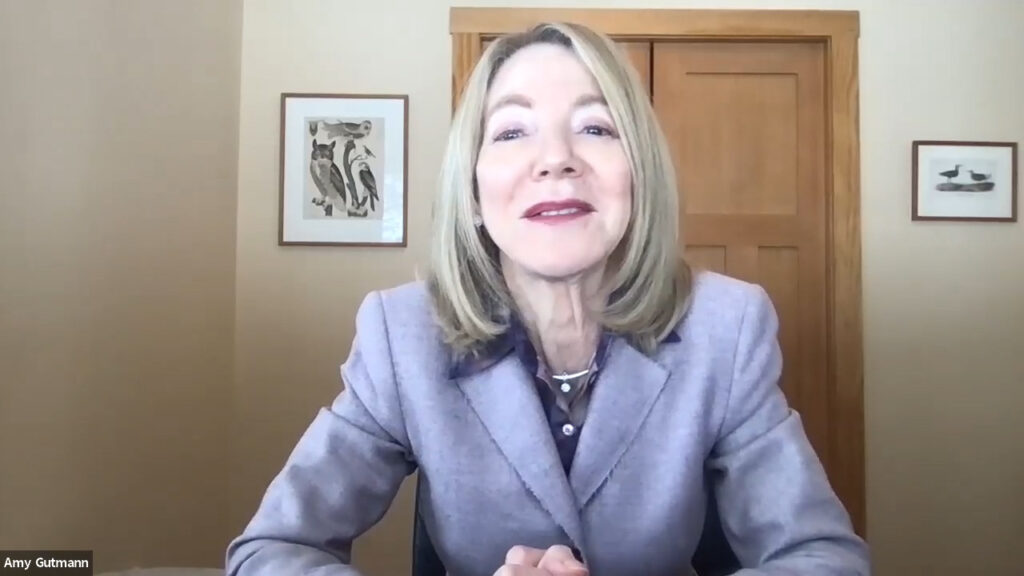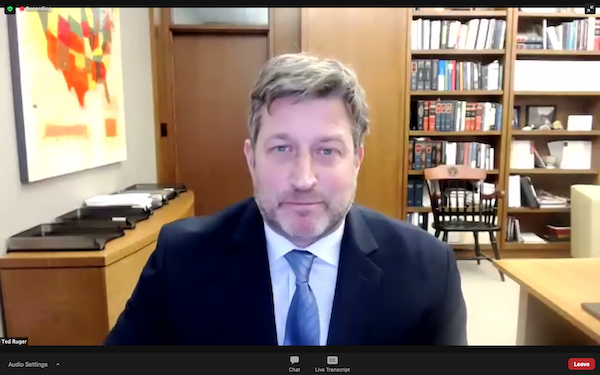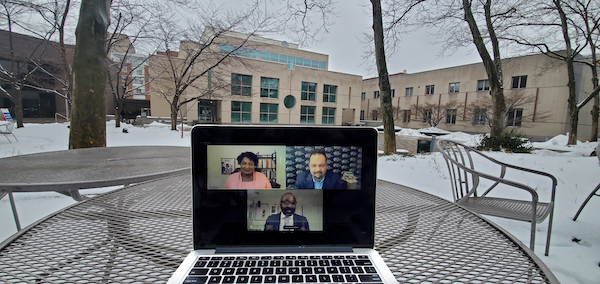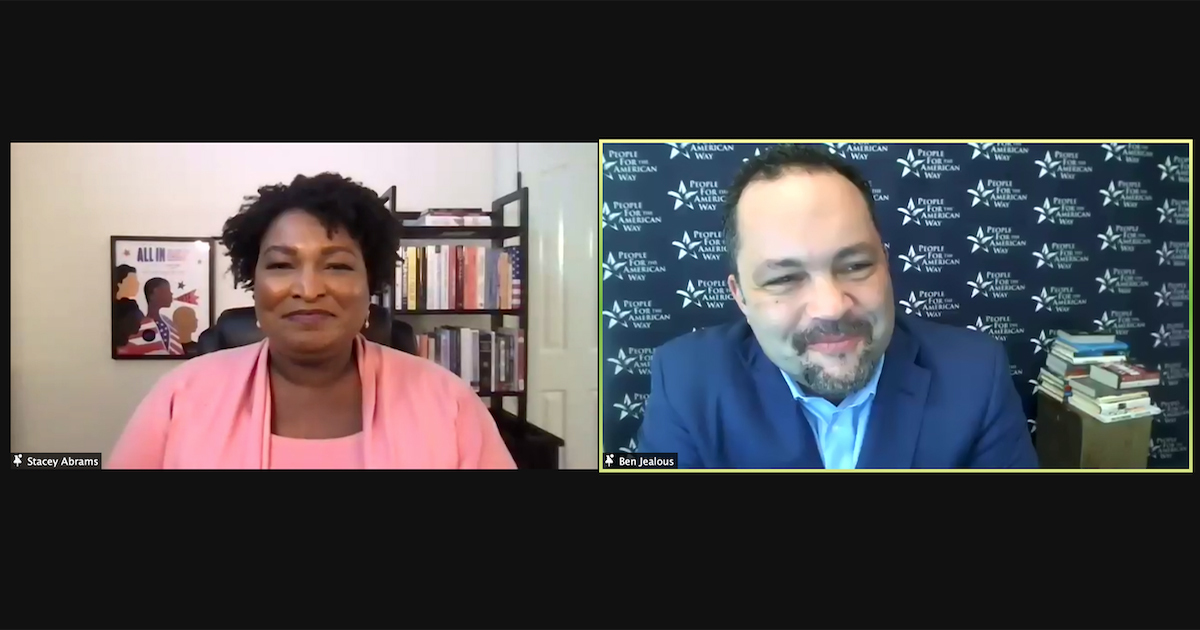After Stacey Abrams lost the 2018 Georgia governor’s race, she said she was “the saddest I’ve ever been and the most worthless I’ve ever felt.” She gave herself 10 days to grieve, watch TV, feel depressed and mad, and then she transformed those emotions into action.
“Ambition doesn’t allow itself to be rewarded by not getting what you want. Sometimes it’s an opportunity to expand how you think about it, or understand what you need to do differently,” she told the virtual audience in a conversation at Penn. “I got through those bouts by remembering why I do it, remembering my job isn’t to win; it is to move forward.”
Abrams shared her thoughts on a wide range of topics during the hourlong conversation with Ben Jealous, the former (and youngest ever) head of the NAACP and a visiting scholar at the Annenberg School for Communication, the University of Pennsylvania Carey School of Law and School of Social Policy & Practice. The two have a friendship spanning nearly 30 years, and their discussion covered topics from gerrymandering and social media to Abrams’ side gig as a romance novelist and how her political strategy can be compared to a game of spades.

In remarks before the discussion, Penn President Amy Gutmann called Abrams and Jealous “two totally relatable people who have each done extraordinary things,” and urged all attendees to listen carefully to their conversation.
“Think of it not as a testimony to what Olympians have achieved but rather to what every one of us here today and every other citizen can do when we set our hearts and minds to it,” Gutmann said. “The power for social change for the good lies in each of us.”
Annenberg Dean John L. Jackson Jr. and Law School Dean Ted Ruger also made introductory remarks to the virtual audience of over 3,000.
In the days and months that followed her gubernatorial loss, Abrams created Fair Fight, a voter protection organization that helped register hundreds of thousands of new Georgia voters ahead of the 2020 presidential election.
“I don’t think you solve a problem for yourself. I think if you see a problem, you should solve the problem for the person who comes behind you who may not have the resources,” the Democratic politician said. “My responsibility was to fix the system for the next person who was going to run, and fixing the system for the voters who were told their voices didn’t matter.”
The event was sponsored by the Annenberg School for Communication, University of Pennsylvania Carey Law School, Stavros Niarchos Foundation Paideia Program, and Provost’s Office.
In introducing Abrams and Jealous, Ruger noted a tweet Jealous sent the night before the event. In it, Jealous pointed out that he and Abrams organized together in 1994, both ran for governor in 2018 (Jealous ran in Maryland), and both worked together for almost three decades, but the Penn event would be the first time Jealous had ever interviewed Abrams. “We’re lucky to be part of this first,” Ruger said.

Their conversation covered such a range of topics Abrams joked at one point that it was “like the strangest game of ‘Jeopardy’ ever.”
Asked what advice she would give to young people whose ambitions might be bigger than what’s perceived as possible, she had a simple reply.
“Don’t edit your ambitions,” she said. “Get really comfortable with fear and failure. I don’t think of failure as proof that I’m not good, I see it as an opportunity to figure out what I can do better.”
As for redistricting and gerrymandering, Abrams said the best solution is federal action, but another would be transforming the way citizens treat the Census, which is the singular metric used to draw legislative redistricting lines.
“We treat it as a once-a-decade intrusion in our privacy. I see it as a 10-year opportunity for organization, strategy, and planning,” she said. “We’ve got to use the census as a tool for our success, as opposed to allowing it to be weaponized to deny us our agency.”
Asked how to get working people across racial lines to recognize their own self-interest and come together, Abrams pressed the importance of first recognizing the difference between populism that is with and for the people, and the authoritarian populism that’s undermining democracy in places like Brazil and Hungary and that remains a danger in the United States.

She sees the more important question as one of what do people prioritize as their best self-interest? Where she grew up in the South, people’s most important self-interests are so varied, from racial identity to moral and religious identity to economic needs.
It’s challenging and important work for politicians to understand what drives people “because only when you know what drives them can you figure out how to steer them,” she said.
Questions from the audience included one from a Penn English major interested in hearing about Abrams’ past work as a romance author and what drew her to the genre.
Abrams described growing up reading romance novels, which her mother loved, but noting her great aunt was a true collector.
“They are quintessential stories of humanity,” she said of the appeal. “It is about wanting something, not knowing how to get it, fighting to get it and then fighting to keep it. It’s a hero’s journey, just told from a woman’s perspective.”
For her own novels, she combined her love of “James Bond and ‘General Hospital,’” she said.
She described the importance of knowing “the opposition,” reading books by conservatives and watching Fox News, and talked about her successes in the Georgia legislature were the times when she understood what the opposition wanted and was able to harness that to work toward her own goals. She worked with the Georgia Tea Party to block anti-environmental legislation for three years until the governor and Chamber of Commerce finally gave up their push. She understood the Tea Party issue was about undermining property values, not her worry about climate change.
“When it was framed in that way, it may have had the environmental benefit I wanted, but it had the economic needs that they held as important,” she said. “We were able to work together fairly seamlessly for three years to hold the line.”
At the end of the conversation, Jealous quipped that Abrams must be the most productive and dynamic introvert in America, and said after observing her political strategy it occurred to him that as every other politician was playing poker, Abrams was playing spades. He asked what politicians could learn from the game of spades.
“You’ve got a partner, and you have to be able to trust your partner, but you also have to be willing to sacrifice in order to win,” she said. Her dad taught her how to play and encouraged her to play to win, told her not to hold onto her cards and not to wait to play until the end.
“Sometimes you’ll have to sacrifice a queen or king to an ace, but if that gets you closer to being able to play a spade against someone else’s face card, do it. Play to win,” she said.
“My grandmother said, ‘Every card only wins once; the cards are what they are,’” she said, so there was no point in holding on and waiting around. “You have to watch the table; you’ve got to know what fell. I watch my partner, but I also watch the table so that I know what not to do, or what opportunity is coming up for me to take advantage of.”
In closing out the event, Annenberg Dean John L. Jackson Jr. remarked that as a native of Brooklyn and a Howard University alum, he could spend lots more time talking about spades, and thanked Abrams and Jealous for sharing their insights.
“It’s felt so inspiring and edifying to be able to eavesdrop on this conversation and clearly one filled with love and mutual respect, which is good to see in public context, also so holistically thinking about politics as steeped in all the other things we do every day,” he said, adding he was “looking forward to seeing what you both are able to pull out of 2021 for the betterment of our entire body politic.”
A video of the virtual discussion is posted until March 7 and can be viewed on YouTube.

